人教版七年级英语上册 Unit 5 Do you have a soccer ball? 知识点 课件(共53张PPT)
文档属性
| 名称 | 人教版七年级英语上册 Unit 5 Do you have a soccer ball? 知识点 课件(共53张PPT) | 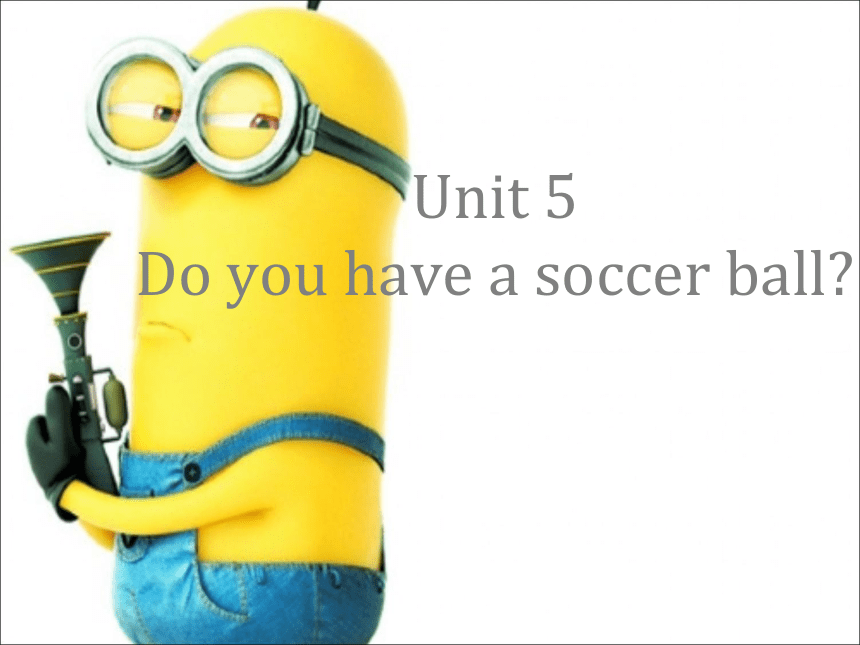 | |
| 格式 | zip | ||
| 文件大小 | 8.6MB | ||
| 资源类型 | 教案 | ||
| 版本资源 | 人教新目标(Go for it)版 | ||
| 科目 | 英语 | ||
| 更新时间 | 2022-07-21 12:52:34 | ||
图片预览

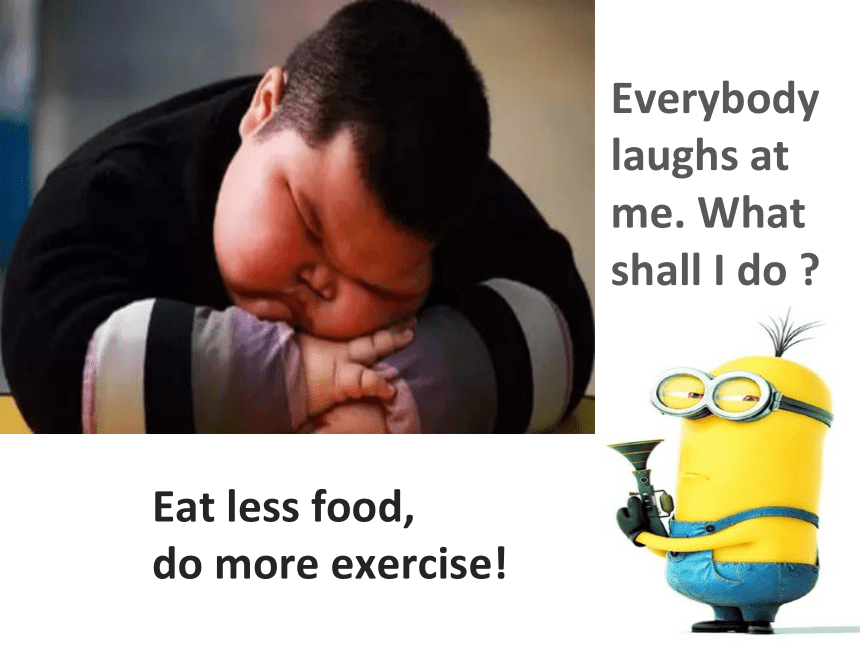
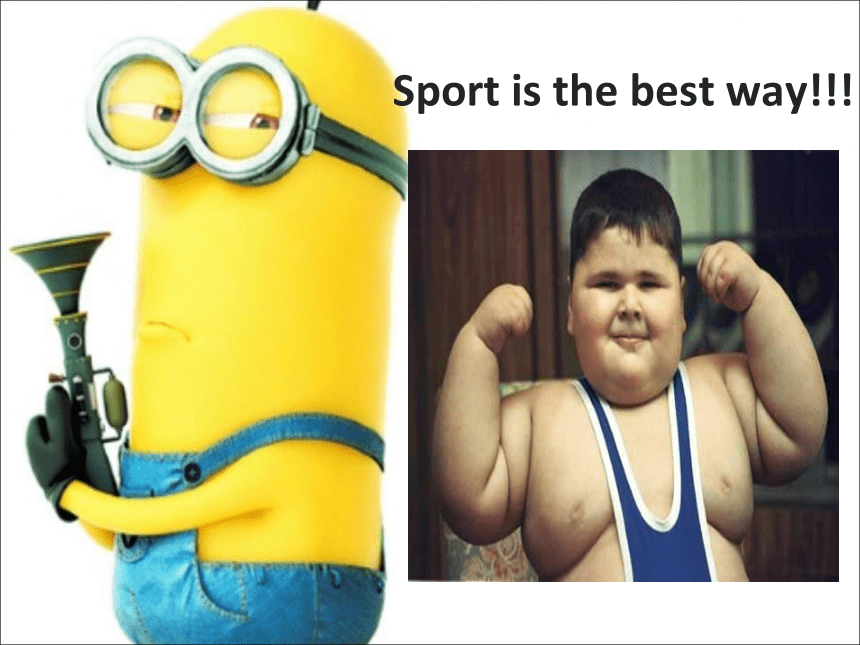
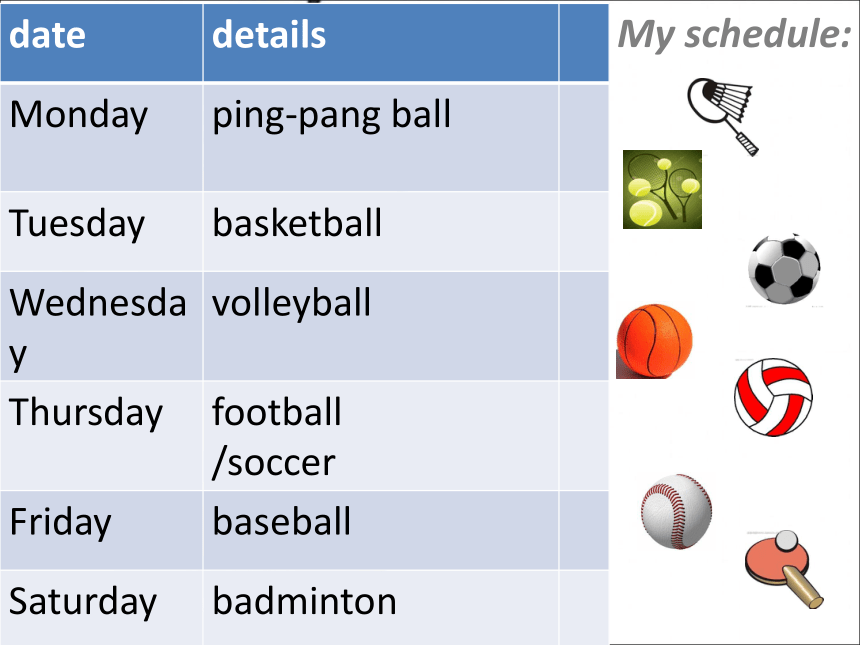
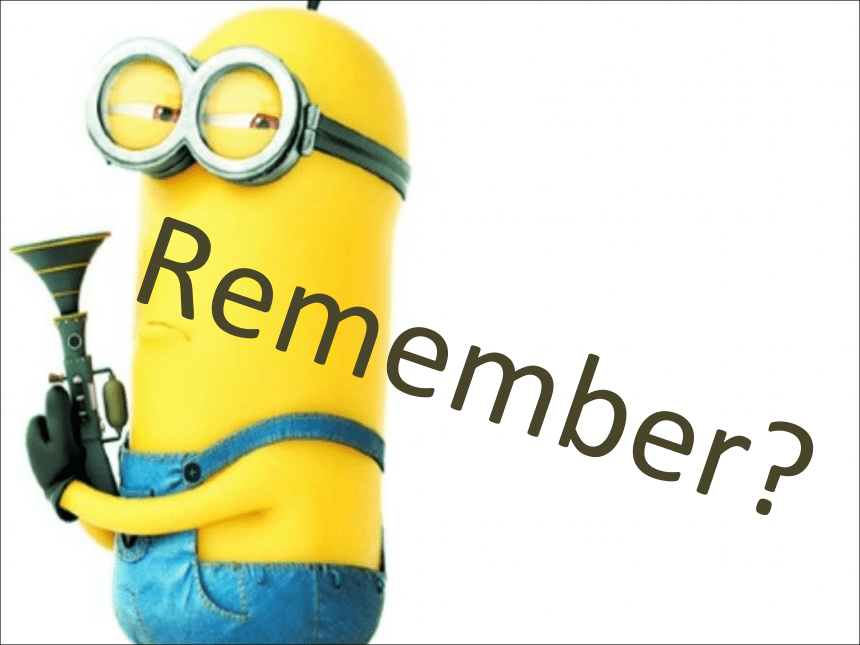
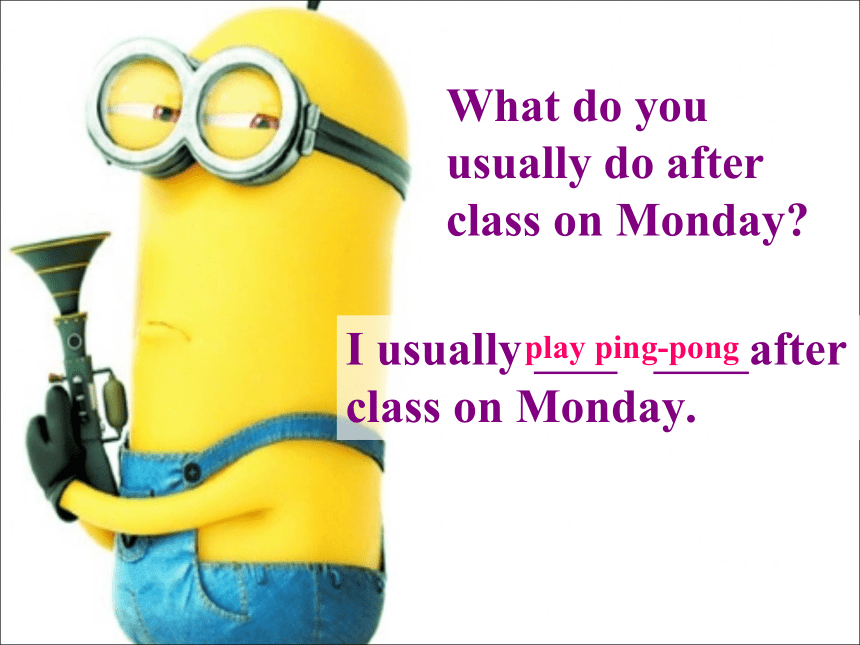
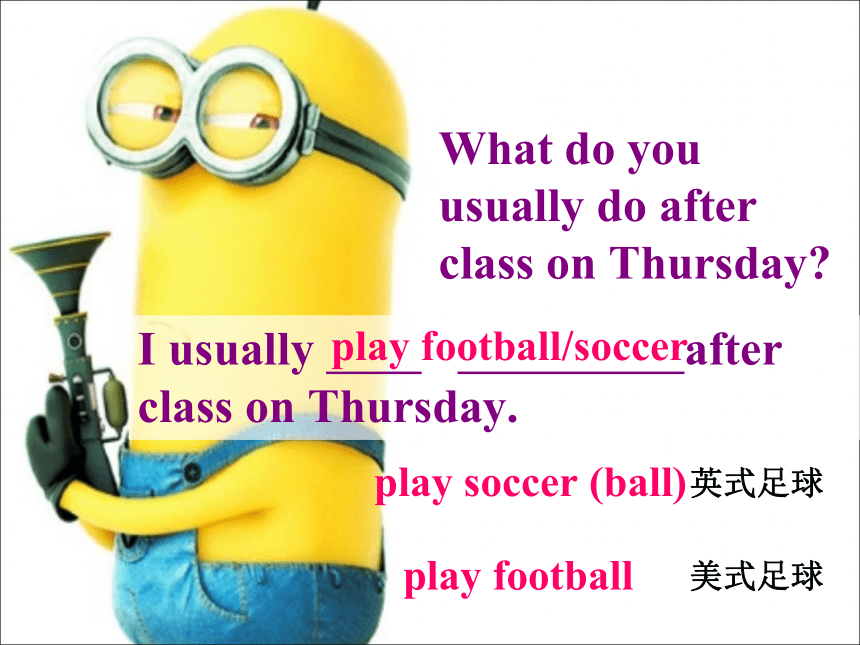
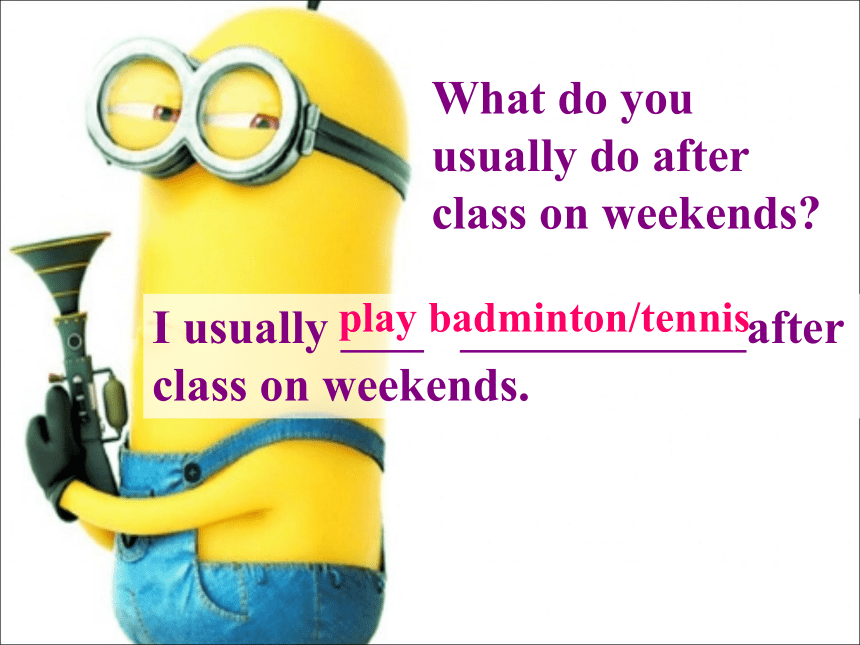
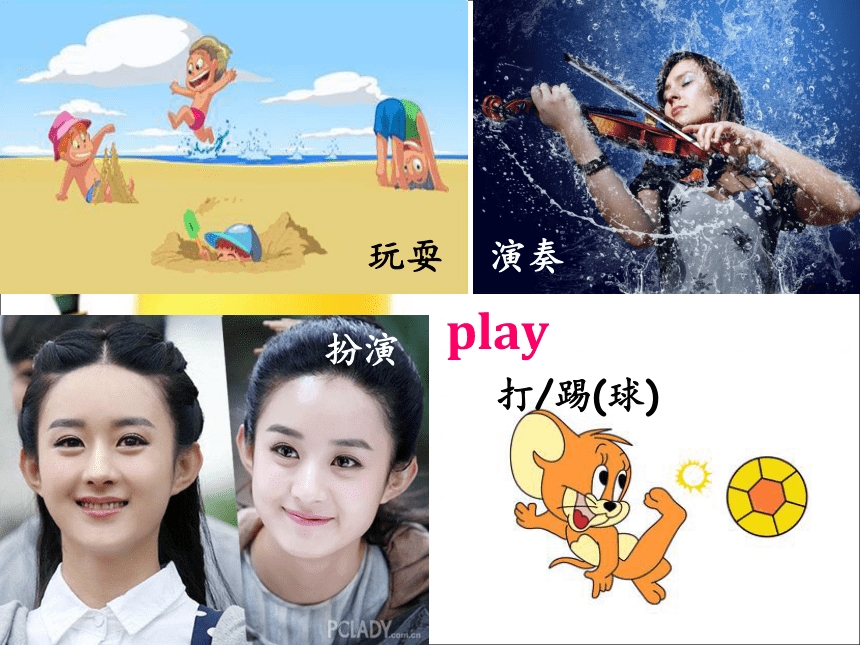
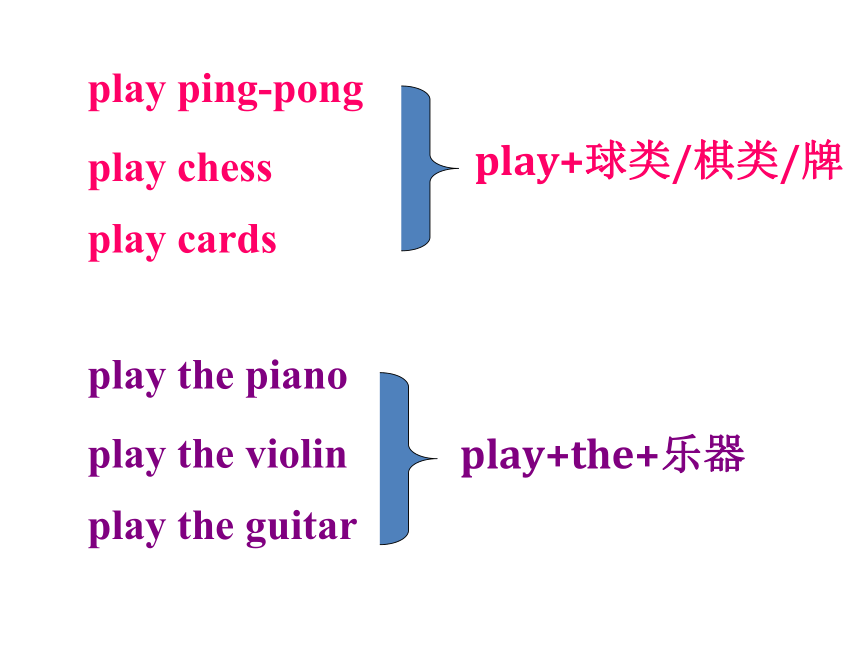
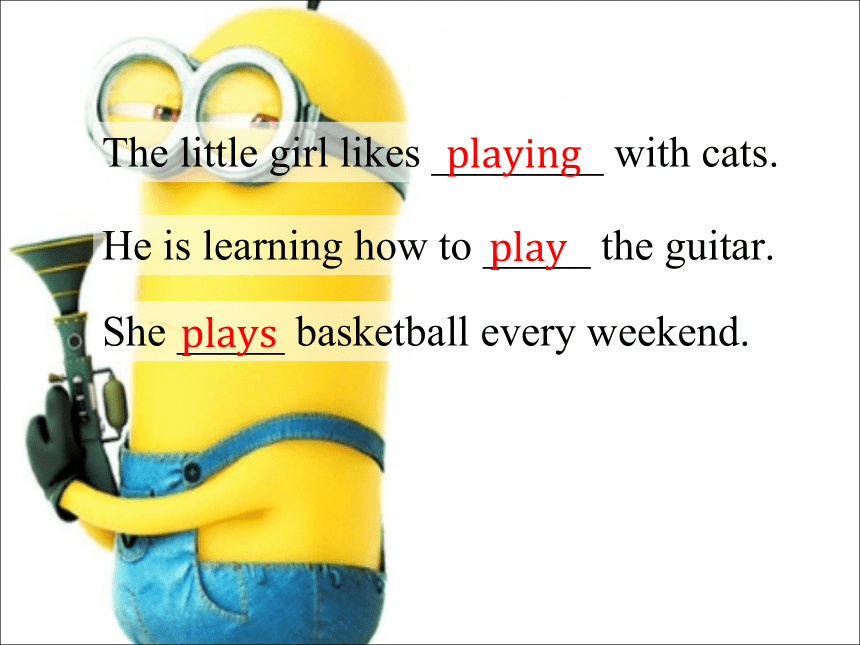
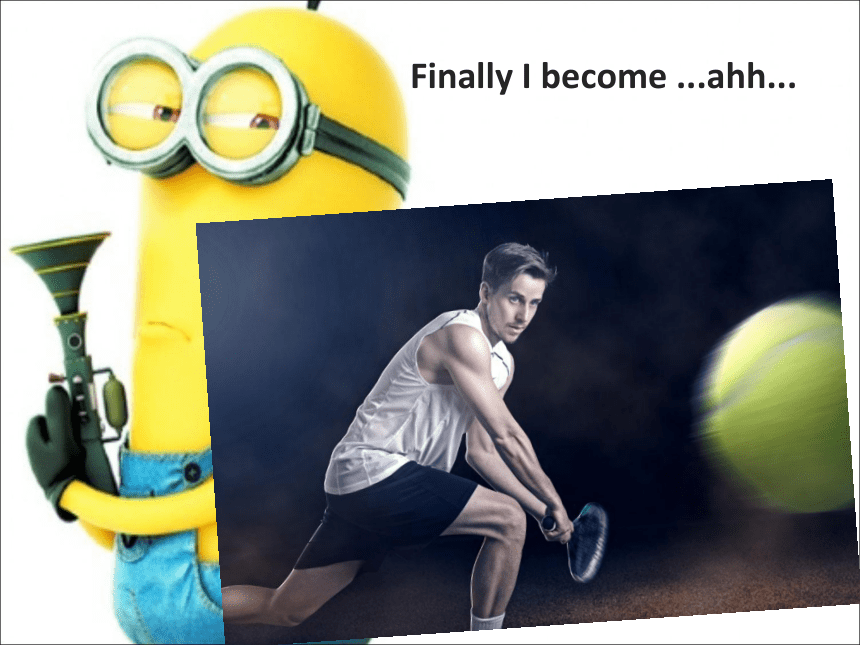
文档简介
(共53张PPT)
Unit 5
Do you have a soccer ball
Everybody laughs at me. What shall I do
Eat less food,
do more exercise!
Sport is the best way!!!
My schedule:
date details
Monday ping-pang ball
Tuesday basketball
Wednesday volleyball
Thursday football /soccer
Friday baseball
Saturday badminton
Sunday tennis
Remember
What do you usually do after class on Monday
I usually after class on Monday.
play ping-pong
play soccer (ball)
英式足球
play football
美式足球
What do you usually do after class on Thursday
I usually after class on Thursday.
play football/soccer
What do you usually do after class on weekends
I usually after class on weekends.
play badminton/tennis
play
演奏
打/踢(球)
玩耍
扮演
play+球类/棋类/牌
play+the+乐器
play ping-pong
play chess
play cards
play the piano
play the violin
play the guitar
The little girl likes ________ with cats.
He is learning how to _____ the guitar.
playing
play
She _____ basketball every weekend.
plays
Finally I become ...ahh...
I often goes shopping with my girlfriend.
和...一起
I write this love letter with my loved pen.
使用
I plan to buy a house with a garden.
带有
Grammar Focus
Does she have football/volleyball/tennis…
No,she doesn’t. She has ping-pong .
Does he have…
Yes,he does./
No,he doesn’t.He has a baseball.
肯定句: 主语+have/has...
I have money.
He has time.
have: 实义动词 “有”,其三单形式是has.
否定句:主语+don't/doesn't have...
I don't have money.
He doesn't have time.
— Do he has time
— Yes, he do.
— No, he don't.
一般疑问句:
— Do you have money
— Yes, I have.
— No, I don't have.
×
×
— Yes, I do.
— No, I don't.
×
— Does he have money
— Yes, he does.
— No, he doesn't.
×
×
×
Correct it~
1. Do you have a ping-pong bat
-- Yes, I do.
-- No, I don't. I have a ping-pong ball.
2. Do they have a basketball
-- Yes, they do.
-- No, they don't. They have a volleyball.
Have/has
3. Does he/she have a tennis ball
-- Yes, he/she does.
-- No, he/she doesn't.
He/She has a baseball.
— Does Mary have a watch
— Yes, she does.
— No, she doesn’t. She has a mobile phone.
Have/has
句子的谓语动词是实义动词时,其一般疑问句常借助助动词do或does来提问。
如果是含有be动词的一般疑问句呢?
be动词提前至句首:
She is beautiiful.
Is she beautiful
My father ____ a tennis racket. But he ____ a ping-pong bat.
A. have; has
B. has; doesn't have
C. have; don't have
D. has; doesn't has
B. has; doesn't have
2. — Do you have an English book
— No, I _____.
A. do B. don't
C. does D. doesn't
B. don't
3. I ____ two pens, and my brother
____ three.
A. have; has
B. has; have
C. have; have
D. has; has
A. have; has
4. I have a ping-pong bat. (改为一般疑问句)
____ _____ ______ a ping-pong bat
5. Danny often ______ (play) basketball.
6. 玛丽有两本书。
________________________
7. She has a TV.
(改为一般疑问句,并作肯否定回答)
_______________________?
_________________
___________________
Do
you
have
plays
Mary has two books.
Does she have a TV
Yes, she does.
No, she doesn't.
Reading
difficult
relaxing
watch
same
sport
like
easy
after class
classmate
let
go
late
get
great
sound
interesting
boring
fun
let us VS let’s
Let's go !
Let us go !
let's是包括说话者和听者在内
let us是不包括听者在内
Eg: let’s go to the park, shall we
Eg: let us go to the park,will you
— Let's play cards!
— That sounds good!
当别人提出建议时,你表达对该建议的观点时,用句型:That sounds + 形容词
sound:感官动词 “听起来好像”
sound + adj.
eg. Your idea sounds great.
let sb do sth.
smell 闻起来
feel 摸起来,感觉
taste 尝起来
look 看起来
Let's _____ for a walk, shall we
A. to go B. going
C. go D. gone
C
go for a walk 去散步
2. — Listen, the music _____ sweet.
— It's Yesterday Once More, my favorite.
A. sounds B.smells
C. feels D. sound
A
3. Project Hope has built many schools
_____ big classrooms and libraries.
A. in B. of C. for D.with
D
with 带有,配备
4. — Let's watch TV.
— Yes, it _____ nice.
A. spells B. calls
C. sounds D.watches
C
get v.
1. 去取
eg. Get me some water, please.
Get some water for me , please.
2. 得到
eg. I get a letter from my brother every week.
get sb sth
get sth for sb
给某人取某物
get sth from...
从...取/得到某物
We can get our money from the bank.
be interesting
be interested in
修饰物或事
人作主语
The book is interesting.
I am interested in the interesting book.
boring, bored
exciting, excited
前者修饰物或事,后者修饰人
fun [U] n. 乐趣,快乐
We have fun in playing basketball.
have fun (in doing sth)
(做某事)玩得高兴
Don't make fun of your brother.
make fun of sb 取笑某人
funny adj. 有趣的
It's funny to play cards.
It's + adj. + to do sth
difficult
adj. 困难的
反义词是easy
同义词是hard
It's not difficult to learn English well.
It's + adj. + to do sth
It's difficult for me to play ping-pong.
It's difficult (for sb) to do sth
(对某人来说)做某事是困难的
1. The park is a ____________ (令人放松的) place.
relaxing
2. That ___________ (听起来) very great.
sounds
3. The book is i_____________. You should read it.
4. The question is d_________. I can't answer it.
nteresting
ifficult
5. — Let's play football.
— That sounds _____. I like it.
A. interesting B. boring
C. difficult D.easy
A
watch TV 看电视
I watch the game on TV.
在电视上
sport
体育运动
have sports 参加体育运动或比赛
We often have sports at school after class.
sport 作“体育”的总称时,一般用作不可数名词
特指“(某项)运动”时,常用作可数名词
lizi
like v. 喜欢,喜爱
like doing sth
like to do sth
表示习惯性的动作或爱好
表示一次性或特指的某一具体动作
eg. I like visiting friends on Sundays and I like to visit Joan this Sunday.
class n. 班级;课
eg. There are 30 classes in this school.
All the students are in class.
in class 在上课
have class 上课
after class 课后
1. — Bill, what's your sister's favorite_____
— She likes volleyball best.
A. food B. color
C. sport D. movie
C
2. — What does your sister like doing in her
spare time
— She _____ watching TV.
A. likes B. liked
C. has liked D. had liked
A
spare time 空闲时间
=free time
let 允许;让
go 去;走
late 迟到
get 去取;得到
great 美妙的,伟大的
sound 听起来好像
interesting 有趣的
boring 无聊的,令人厌倦的
fun 有趣的,使人快乐的
difficult 困难的
relaxing 令人放松的
watch 注视,观看
same 相同的
sport 体育运动
like 喜欢
easy 容易的
after class 下课后
classmate 同班同学
Unit 5
Do you have a soccer ball
Everybody laughs at me. What shall I do
Eat less food,
do more exercise!
Sport is the best way!!!
My schedule:
date details
Monday ping-pang ball
Tuesday basketball
Wednesday volleyball
Thursday football /soccer
Friday baseball
Saturday badminton
Sunday tennis
Remember
What do you usually do after class on Monday
I usually after class on Monday.
play ping-pong
play soccer (ball)
英式足球
play football
美式足球
What do you usually do after class on Thursday
I usually after class on Thursday.
play football/soccer
What do you usually do after class on weekends
I usually after class on weekends.
play badminton/tennis
play
演奏
打/踢(球)
玩耍
扮演
play+球类/棋类/牌
play+the+乐器
play ping-pong
play chess
play cards
play the piano
play the violin
play the guitar
The little girl likes ________ with cats.
He is learning how to _____ the guitar.
playing
play
She _____ basketball every weekend.
plays
Finally I become ...ahh...
I often goes shopping with my girlfriend.
和...一起
I write this love letter with my loved pen.
使用
I plan to buy a house with a garden.
带有
Grammar Focus
Does she have football/volleyball/tennis…
No,she doesn’t. She has ping-pong .
Does he have…
Yes,he does./
No,he doesn’t.He has a baseball.
肯定句: 主语+have/has...
I have money.
He has time.
have: 实义动词 “有”,其三单形式是has.
否定句:主语+don't/doesn't have...
I don't have money.
He doesn't have time.
— Do he has time
— Yes, he do.
— No, he don't.
一般疑问句:
— Do you have money
— Yes, I have.
— No, I don't have.
×
×
— Yes, I do.
— No, I don't.
×
— Does he have money
— Yes, he does.
— No, he doesn't.
×
×
×
Correct it~
1. Do you have a ping-pong bat
-- Yes, I do.
-- No, I don't. I have a ping-pong ball.
2. Do they have a basketball
-- Yes, they do.
-- No, they don't. They have a volleyball.
Have/has
3. Does he/she have a tennis ball
-- Yes, he/she does.
-- No, he/she doesn't.
He/She has a baseball.
— Does Mary have a watch
— Yes, she does.
— No, she doesn’t. She has a mobile phone.
Have/has
句子的谓语动词是实义动词时,其一般疑问句常借助助动词do或does来提问。
如果是含有be动词的一般疑问句呢?
be动词提前至句首:
She is beautiiful.
Is she beautiful
My father ____ a tennis racket. But he ____ a ping-pong bat.
A. have; has
B. has; doesn't have
C. have; don't have
D. has; doesn't has
B. has; doesn't have
2. — Do you have an English book
— No, I _____.
A. do B. don't
C. does D. doesn't
B. don't
3. I ____ two pens, and my brother
____ three.
A. have; has
B. has; have
C. have; have
D. has; has
A. have; has
4. I have a ping-pong bat. (改为一般疑问句)
____ _____ ______ a ping-pong bat
5. Danny often ______ (play) basketball.
6. 玛丽有两本书。
________________________
7. She has a TV.
(改为一般疑问句,并作肯否定回答)
_______________________?
_________________
___________________
Do
you
have
plays
Mary has two books.
Does she have a TV
Yes, she does.
No, she doesn't.
Reading
difficult
relaxing
watch
same
sport
like
easy
after class
classmate
let
go
late
get
great
sound
interesting
boring
fun
let us VS let’s
Let's go !
Let us go !
let's是包括说话者和听者在内
let us是不包括听者在内
Eg: let’s go to the park, shall we
Eg: let us go to the park,will you
— Let's play cards!
— That sounds good!
当别人提出建议时,你表达对该建议的观点时,用句型:That sounds + 形容词
sound:感官动词 “听起来好像”
sound + adj.
eg. Your idea sounds great.
let sb do sth.
smell 闻起来
feel 摸起来,感觉
taste 尝起来
look 看起来
Let's _____ for a walk, shall we
A. to go B. going
C. go D. gone
C
go for a walk 去散步
2. — Listen, the music _____ sweet.
— It's Yesterday Once More, my favorite.
A. sounds B.smells
C. feels D. sound
A
3. Project Hope has built many schools
_____ big classrooms and libraries.
A. in B. of C. for D.with
D
with 带有,配备
4. — Let's watch TV.
— Yes, it _____ nice.
A. spells B. calls
C. sounds D.watches
C
get v.
1. 去取
eg. Get me some water, please.
Get some water for me , please.
2. 得到
eg. I get a letter from my brother every week.
get sb sth
get sth for sb
给某人取某物
get sth from...
从...取/得到某物
We can get our money from the bank.
be interesting
be interested in
修饰物或事
人作主语
The book is interesting.
I am interested in the interesting book.
boring, bored
exciting, excited
前者修饰物或事,后者修饰人
fun [U] n. 乐趣,快乐
We have fun in playing basketball.
have fun (in doing sth)
(做某事)玩得高兴
Don't make fun of your brother.
make fun of sb 取笑某人
funny adj. 有趣的
It's funny to play cards.
It's + adj. + to do sth
difficult
adj. 困难的
反义词是easy
同义词是hard
It's not difficult to learn English well.
It's + adj. + to do sth
It's difficult for me to play ping-pong.
It's difficult (for sb) to do sth
(对某人来说)做某事是困难的
1. The park is a ____________ (令人放松的) place.
relaxing
2. That ___________ (听起来) very great.
sounds
3. The book is i_____________. You should read it.
4. The question is d_________. I can't answer it.
nteresting
ifficult
5. — Let's play football.
— That sounds _____. I like it.
A. interesting B. boring
C. difficult D.easy
A
watch TV 看电视
I watch the game on TV.
在电视上
sport
体育运动
have sports 参加体育运动或比赛
We often have sports at school after class.
sport 作“体育”的总称时,一般用作不可数名词
特指“(某项)运动”时,常用作可数名词
lizi
like v. 喜欢,喜爱
like doing sth
like to do sth
表示习惯性的动作或爱好
表示一次性或特指的某一具体动作
eg. I like visiting friends on Sundays and I like to visit Joan this Sunday.
class n. 班级;课
eg. There are 30 classes in this school.
All the students are in class.
in class 在上课
have class 上课
after class 课后
1. — Bill, what's your sister's favorite_____
— She likes volleyball best.
A. food B. color
C. sport D. movie
C
2. — What does your sister like doing in her
spare time
— She _____ watching TV.
A. likes B. liked
C. has liked D. had liked
A
spare time 空闲时间
=free time
let 允许;让
go 去;走
late 迟到
get 去取;得到
great 美妙的,伟大的
sound 听起来好像
interesting 有趣的
boring 无聊的,令人厌倦的
fun 有趣的,使人快乐的
difficult 困难的
relaxing 令人放松的
watch 注视,观看
same 相同的
sport 体育运动
like 喜欢
easy 容易的
after class 下课后
classmate 同班同学
同课章节目录
- starters 预备篇(2012秋审查)
- Unit 1 Good morning !
- Unit 2 What’s this in English?
- Unit 3 What color is it ?
- Unit 1 My name's Gina.
- Section A
- Section B
- Unit 2 This is my sister.
- Section A
- Section B
- Unit 3 Is this your pencil?
- Section A
- Section B
- Unit 4 Where's my schoolbag?
- Section A
- Section B
- Unit 5 Do you have a soccer ball?
- Section A
- Section B
- Unit 6 Do you like bananas?
- Section A
- Section B
- Unit 7 How much are these socks?
- Section A
- Section B
- Unit 8 When is your birthday?
- Section A
- Section B
- Unit 9 My favorite subject is science.
- Section A
- Section B
